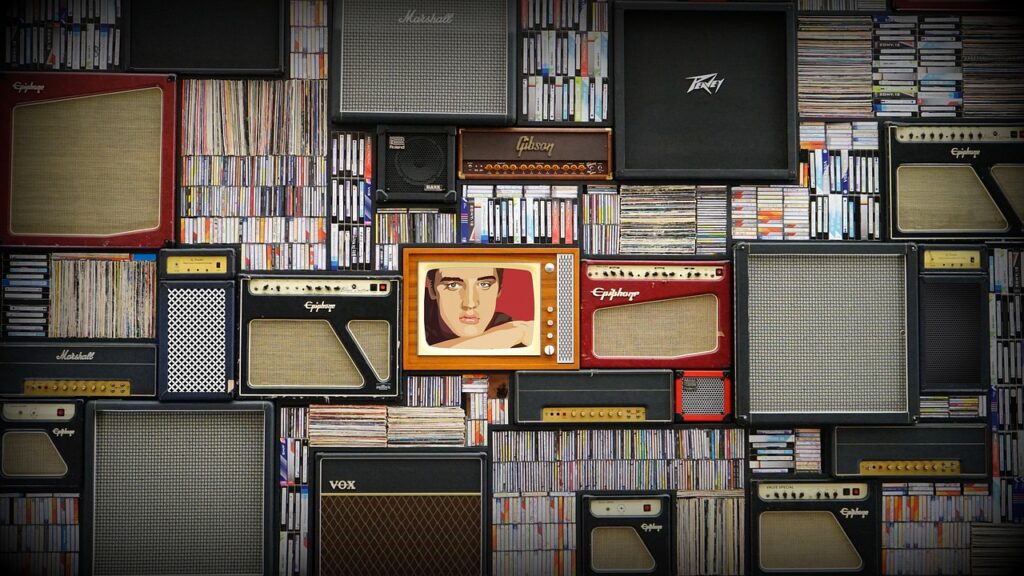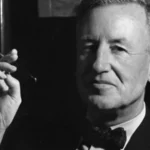By Anita Murgulch, student at Taipei European School
Popular culture has always been more than entertainment; it reshapes the way we see and interpret the world around us. Alan Watts once wrote:
“We seldom realize, for example, that our most private thoughts and emotions are not actually our own. For we think in terms of languages and images which we did not invent, but which were given to us by our society.”
This insight reminds us that the songs we hear, the films we watch, and the words we speak are not neutral. They form the very framework through which we think and feel. In this sense, popular culture provides both the language and the imagery of our collective imagination.
The Collective Script
To write and to be written for, as author and reader, is to enter a shared universe where stories and symbols rearrange us. The author, holding the pen, circles away into their own world, altering every detail at will; the reader, in turn, takes on the responsibility of interpreting the universe brought to life. In both cases, the act of creation and reception leaves traces, like a tail stretching behind us, that influence not only the individual but also the wider society that grasps onto those marks. These images, words, and narratives become a collective script that guides how we see ourselves and others.
Popular culture, mass-consumed in music, film, television, fashion, memes, or the internet in general, gives us the lenses through which we understand identity, power, and community. It does not simply reflect reality but modifies it, dictating the terms of what is imaginable and possible.
The question, then, is not whether popular culture influences us, but how profoundly it changes our understanding of the world through identity, norms, and shared narratives.
Social experiences have been around for decades, from classroom debates to street demonstrations and even long-term social movements whose effects ripple across generations. These experiences guide us toward an understanding of how our future paths unfold. Our cultural industry once relied primarily on books and historical accounts, but today it filters through television, film, and the internet. Systems of “soft power” that transmit influence almost invisibly. In fashion, in art, in music, a subtle yet powerful reshaping of identity takes place.
Music as a Shared Identity

Modern ways of living provide the depictions and languages that shape how individuals and groups see themselves. Music subcultures, for instance, offer entire worlds of identity. Hip-hop did not just entertain; it reshaped Black identity and resistance, giving a voice to the marginalized and producing styles that spread across continents.
Meanwhile, K-pop has built a global youth identity, mixing Korean cultural aesthetics with universal themes of belonging and passion. Rock artists once shouted warnings about the future, while indie artists today reflect on the fragile norms of love and intimacy. Each genre becomes a mirror, but also a mold. Fashion joins the dialogue. Harry Styles’ gender-fluid fashion redefines masculinity, challenging silent rules of gender expression. The once “perfect” model body glorified by Victoria’s Secret is being contested by campaigns of inclusivity, showing that beauty is no longer confined to a single silhouette. Yet even as it expands possibilities, fashion continues to pressure people into conformity through trends, creating both liberation and new restrictions.
Film and television influence identity from childhood. Disney princesses; delicate, obedient, romantic set early ideals of femininity, suggesting how a girl should act or what colors she should prefer. Meanwhile, Marvel superheroes instill models of masculinity: the strong protector, the muscular savior, the noble fighter. These stories, bright and glittering, bridge the gap between childhood imagination and adult expectations, shaping physical aspirations and emotional behavior. They build bridges but sometimes walls over what we are allowed to be.
What can we do?
Exposure to these cultural products changes how we imagine ourselves and others. Yet identity can be effortlessly restricted, confined by stereotypes at every turn. Like contrails left by airplanes across the sky, the evidence of flights centuries after the first dreams of human flight, the culture leaves visible lines in our imagination, lines that suggest where we may go but also which paths are already mapped out for us.
Challenging the Systems of Power Through Pop Culture
The contemporary lifestyle and its implicit rules can both reinforce and challenge the systems of power that govern us. Popular culture operates as a double-edged sword.
Music has long been a weapon of protest. Bob Dylan’s The Times They Are A-Changin’ (1964) became an anthem for civil rights and social change, while his A Hard Rain’s A-Gonna Fall warned of political and environmental disaster. Decades later, Kendrick Lamar’s Alright (2015) echoed through Black Lives Matter protests, carrying the refrain “We gon’ be alright” as both consolation and resistance.
These songs did not merely describe reality, they reshaped how listeners understood injustice and the possibility of change.
Film equally disrupts norms. Greta Gerwig’s Barbie (2023) re-opened global debates on feminism, forcing audiences to re-examine not only plastic dolls but also the expectations placed on women. Jordan Peele’s Get Out (2017) reshaped discussions on race, revealing how systemic racism hides behind everyday politeness.
Both films show that art does not simply entertain, it dismantles illusions.
The Dual Role of Social Media
Social media amplifies these shifts. Influencers challenge elitist barriers by giving ordinary voices global reach. A teenager with a phone can now spark international conversations, destabilizing traditional centers of authority. Yet, the same platforms reinforce consumerism, beauty standards, and patriarchal control. Filters promise perfection but chain us to illusions. Thus, popular culture is both an instrument of empowerment and a mechanism of control.
This tension echoes patterns seen throughout history. Poets like Arthur Rimbaud once wrote critical verses against the bourgeoisie, denouncing social hypocrisy. More than a century later, the same struggle persists except today’s stage is Instagram or TikTok. What was once whispered in poetry is now shouted in viral trends, reminding us that the fight between conformity and liberation is timeless.
Shared narratives transcend borders, weaving a collective understanding of history, morality, and the future. They are both unifying myths and controlling scripts.
Social media again illustrates this dual role. Cameras, microphones, and algorithms observe every movement, predicting desires before we even feel them. As the saying goes: “If you’re not paying for the product, then you are the product.” Fifty designers in Silicon Valley can steer the attention of two billion users, planting ideas they never thought they’d have. The envy of perfection creates fear, pushing children to chase unattainable standards, even at the cost of their safety. This is not just culture, it is architecture of thought.
And yet, global fandoms offer a softer version of this narrative control. Harry Potter shaped an entire generation’s moral compass with its tales of courage and friendship. Marvel provided myths of justice and sacrifice. Sports like the Olympics and the World Cup unite people through competition and humanity, echoing rituals as old as antiquity but adapted for modern screens. Even memes, ephemeral jokes become global symbols of political commentary, humor instantly understood across cultures through caricatures.
Voice in Times of Crisis
In times of crisis, these narratives matter. When wars break out, in Ukraine, in Israel and Palestine, social media becomes both a battlefield and mirror. Narratives circulate faster than bullets: images of suffering, calls for solidarity, and competing claims to truth. In Nepal, when the parliament was destroyed and no government stood, citizens turned to online networks to make sense of chaos. These events prove that popular culture is no longer a spectator but a participant in history, reshaping not only how we interpret events but also how we act in response.
Popular culture is not simply entertainment; it is a force that reshapes identity, norms, and narratives. It predicts, it molds, it manipulates, and it liberates. In the age of globalization and digital media, its influence grows stronger and faster than ever. Each circuit of data, each algorithmic prediction, each image shared creates another version of us, another story written into our collective imagination.
Like trails across the sky, popular culture leaves marks that guide us into the future. It speaks in the voices of artists and influencers, in the lines of poets from Rimbaud to Kendrick Lamar, in the images of princesses and superheroes, in the shared myths of sports and fandoms. By reshaping imagination, it reshapes reality. And in doing so, it reveals that the world we inhabit is not only lived, but constantly rewritten through the stories we tell, share, and believe.
About the Author
Anita Murgulch is a high school junior (H3) at the Taipei European School with a passion for law, international relations, and diplomacy. She has taken part in volunteer work, explored legal and diplomatic settings through internships. Outside the classroom, Anita is active in sports such as horse riding, badminton and tennis, and has competed nationally in equestrian jumping. She also enjoys creative projects, from producing film critique writing and podcasts with her cinema team to designing awareness campaigns with her group Rise & Reach collaborating with other NGO’s. Fluent in several languages, Anita hopes to pursue a career in international law and diplomacy, combining academic study with meaningful action.
Books & Quotes
- Watts, Alan. The Book: On the Taboo Against Knowing Who You Are. Vintage Books, 1989.
Music
- Dylan, Bob. The Times They Are A-Changin’. Columbia Records, 1964.
- Dylan, Bob. A Hard Rain’s A-Gonna Fall. Columbia Records, 1963.
- Lamar, Kendrick. Alright. Interscope Records, 2015.
Films
- Get Out. Directed by Jordan Peele, Universal Pictures, 2017.
- Barbie. Directed by Greta Gerwig, Warner Bros., 2023.
Web / Media Sources
- “Social Media.” Encyclopaedia Britannica, https://www.britannica.com/topic/social-media. Accessed 23 Sept. 2025.
- Orlowski, Jeff, director. The Social Dilemma. Netflix, 2020.
Language Tools
- “Synonyms.” Merriam-Webster Thesaurus, https://www.merriam-webster.com/thesaurus. Accessed 23 Sept. 2025.
- “Logical Connectors in English.” University of Adelaide Writing Centre, https://www.adelaide.edu.au/writingcentre. Accessed 23 Sept. 2025.
- More than Sound: Listening to What Makes Us Human - January 23, 2026
- When Justice Stops Feeling Abstract - January 10, 2026
- How Chips Quietly Shape Power - January 3, 2026


